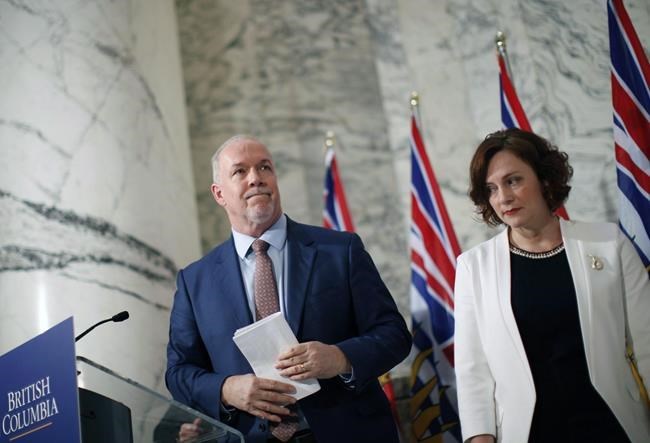 With his “heavy heart” on his sleeve and his eyes on the bottom line, Premier John Horgan threw up his hands and decided Monday to carry on with the Site C dam.
With his “heavy heart” on his sleeve and his eyes on the bottom line, Premier John Horgan threw up his hands and decided Monday to carry on with the Site C dam.
He was downcast, resentful and bitter about the box the B.C. Liberals put him in by successfully driving the project past the point of no return before their government collapsed.
But he deserves credit for being honest about how he feels about it. There was no skating around the vicious arguments already breaking out inside the NDP. There was no attempt to adjust past positions to try to align them with the fact that he is taking over responsibility for whatever the Peace River power project’s legacy turns out to be. He said he’s “making the better of a bad situation.”
Horgan acknowledged his party never favoured the idea of damming the Peace for the third time. He said an NDP government would never have started it. But there was no escaping that B.C. is two years and $2 billion into the job, and it would cost almost another $2 billion to back all the way out to square one.
Turning back was judged too expensive, and costs were the dominant issue from start to finish in all the agonizing his government did over the decision.
Electricity rates are already ramping up steadily, and cancellation would have made the ramp much steeper. So the NDP government is going to grit its teeth and preside over the completion of the Liberals’ legacy project. They’re going to loathe every moment of it.
It’s not exactly the kind of chipper, can-do attitude you’d like to see in a government that’s setting out to spend billions more dollars on the biggest project in B.C. history. If president John F. Kennedy had started the space program in this frame of mind, they’d barely be getting chimps into orbit by now.
But that’s how they feel, and the premier wasn’t shy about showing it. He was flanked by a miserable-looking environment minister, George Heyman, and a dejected energy minister, Michelle Mungall. They showed up knowing they were about to get buried in hate mail, and will have to spend years explaining themselves to people who feel betrayed.
Entirely hypothetically, if they’re still around when the project is finished seven years from now, it’s going to be the most dismal ribbon-cutting ever.
People and groups who were counting on the NDP to shut down the project weren’t shy about reacting, either. A couple of First Nations are racing to the courthouse to file for injunctions. A Peace River interest group proclaimed Monday as “the beginning of the end of the NDP government.”
Green Party Leader Andrew Weaver not only denounced the decision, he endorsed a recall campaign against Mungall for taking part in it after she campaigned against the project. He stopped short of withdrawing support for the government, though.
Horgan went to great lengths to explain how hard it was to decide. He has sat across kitchen tables from people who fought the dam for years. A constituent in her 80s asks him to kill it every time she sees him. Some caucus colleagues are “profoundly disappointed.” His wife isn’t crazy about it, either.
The main driver behind the decision to disappoint them all isn’t electricity, or future demand or pricing forecasts. It’s the NDP government’s appetite to do good things for people in other spheres.
As explained in a detailed briefing by officials, cancelling the project would have involved taxpayers or ratepayers eating $4 billion worth of debt, hiking interest costs by up to $150 million a year. And that would have crowded out room for new capital project spending.
That’s 11 hospitals or 66 new secondary schools.
As Horgan said: “If we have to increase our debt-servicing costs … we won’t be able to deliver child care in the term of this government.”
The financing squeeze isn’t entirely the Liberals’ fault. Horgan compounded his own problem. He removed metro Vancouver bridge tolls to appease some commuters, but that loaded billions onto the books for taxpayers at large to pay. So he used a lot of the fiscal room that was needed.
That made the NDP more determined to protect what’s left for social programs, not for filling in big holes in the ground.



